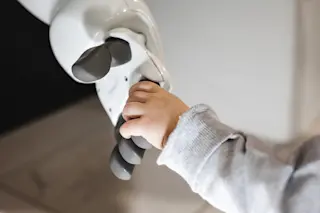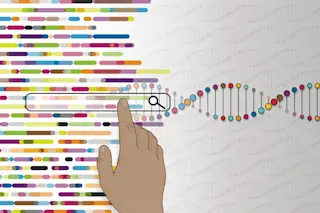“My body, my choice.” We hear that slogan constantly, but what the hell do those four words mean?
Many of us have one or two political issues surrounding our bodies that get us fired up. Many of you reading this right now probably have some hot-button issue on your mind. Maybe it’s abortion, or recreational drug usage, or marriage rights, or surrogatepregnancy, or assisted suicide, or sex work, or voluntary amputation, or gender reassignment surgery.
For each of these issues, there are four words that define our belief about our rights, “My body, my choice.” How you react to those words determine which side of any of those debates you are on. That’s just the thing, though – there aren’t a bunch of little debates, there is just one big debate being argued on multiple fronts. All of these issues find their home in my field of philosophy: bioethics. And within the bioethics community, there is a small contingency that supports a person’s right to choose what to do with their body in every single one of those examples. Transhumanists make up part of that contingency.
If you are pro-choice on abortion or think that gender reassignment surgery is an option everyone should have, you agree with transhumanism on at least one issue. Many current political arguments are skirmishes and turf battles in what is a movement toward what one might call somatic rights. In some cases the law is clear, as it is with marriage rights or drug usage, and the arguments are over whether or not to remove, amend, or change the law. Other cases are so ambiguous that the law is struggling to define itself, as with surrogate pregnancy and voluntary amputation. And sooner or later (I’ve given up on guessing time-frames), instead of merely arguing over what we’re allowed to do with the body we’re born with, there will be debates about our rights to choose what kind of body we have. By looking at the futuristic ideas of genetic engineering and robotic prosthetic technology, we can understand how transhumanism maximizes the “my body, my choice” mantra.
We have a lot of laws about what you can’t do with your body. On the other hand, think about how many different things can be defended with “It’s my body, I’ll do what I want!” Why do we say that? The answer seems painfully obvious: because we’re the only ones who know what it’s like to have our body and it’s probably the only thing we really, truly own. No one can take your body without also taking your life – which as it turns out, is a great way to put your money where your mouth is when you’re a philosopher. Like any good philosopher, however, my job is to examine the painfully obvious. In part, because if it’s all so damn obvious, then why does every lawmaker, religious leader, and jerk with a megaphone think they have a right to tell you or me what to do with our bodies? Is it just jealousy?
Let’s say we live in the future and I have the option to get a robot body and genetically modify my brain to make myself smarter, kinder, and happier. My guess is many people would be very upset if I was traipsing around with a glorious, glistening body made of heretofore unheard of alloys with a genetically tricked-out brain. I would be a magnificent testament to science and engineering. I would be happier, healthier, and smarter. So what possible justification would the paternalists of the world have for telling me I can’t upgrade my physical body?
There are three responses:
Response One: “Your life is just too important for me to let you ruin it, let me set some ground rules to make sure you don’t make a decision you’ll regret later.” The paternalist rule-makers paint themselves as bearing the burden of responsibility for our lives. We don’t know what is good for us, but they do.
Response Two: “What about the children?” Somewhere, out there, is a person with a permanent scowl on his or her face, of whom children are frightened, who has already figured out how my robot body will hurt the children. I imagine it will involve something like “sets a bad impression.”
Response Three: “It breaks with tradition and is immoral.” Understand here that tradition and morality are not ethics. I differentiate morals and ethics in the following way. “Thou shall not kill” is a moral rule. “The biological mother should carry and raise the child, anything else is strange and wrong” is tradition. “Banning marriage between consenting adults of the same-sex is unethical because it infringes upon the life, liberty, and happiness of those individuals based on sexual preference” is ethics. See that “because?” Only in ethics do you have a logical reason following the normative claim. Morality and tradition rely upon the authority of some figure (imagined or not) or history (accurate or not).
In each case, the actual right to your body is deferred to some third party, either the paternalists, the hypothetical children, or unreasoned authority. Transhumanists and like-minded bioethicists recognize that somatic rights are individual rights. That means that, unless they harm someone else directly, you should be able to do as you please. I find it amazing that for all of our amendments protecting freedom of religion, and assembly, and the press, we lack an amendment protecting freedom of bodily self-determination.
A rough and ready version of what freedom of bodily self-determination might look like has three key principles:
“My body, my choice” means that if what you do only affects your body, you should have the right to do it. Period, full stop.
That includes allowing someone to do something to your body. So:
If you want to have something done to your body (e.g. surgery to modify your body or to allow a person to pay you to do something with your body), then you should have the right to do that.
If you don’t want something to happen to your body (e.g. for your body to become pregnant or for it to be kept working at all costs (both in terms of money and dignity)), then you should have that right as well.
Because you have the right to do something, you are also responsible for the results of that decision. For example, if you choose to do drugs, you are culpable for decisions you make while under the influence of those drugs. If you choose to modify your body and, later regret the decision, the fault is no one’s but your own. These simple concepts have a huge impact on not only current laws around issues like abortion, sex assignment surgery in infants, and assisted suicide, but possible future ones surrounding technologies like genetic enhancement, anti-aging medicine, cognitive enhancing drugs, designer babies, voluntary prosthetic augmentation, and cybernetics. As technology advances, we will have more and more ways to choose what to do with our bodies.
As the politics of the body continue to generate controversy, it is important those on the side of choice and freedom of bodily-determination recognize where their allies are. Transhumanists and liberal bioethicists, yes, but also feminists, marriage rights proponents, sex worker advocates, those who would end the drug war, libertarians, and the LGBT community. These groups are fast coming to the conclusion that it is important we cherish our basic biological freedoms and protect our somatic rights.
That means arguing for pro-choice body issues now, in the present. And for those out there who find themselves pro-choice on some issues (e.g. gay marriage and abortion) but anti-choice on others (assisted suicide and genetic engineering), you’d best reevaluate why you have conflicting stances. You shouldn’t. If you disagree with me, I’d love to hear your thoughts in the comments below.
Follow Kyle on his personal blog, Pop Bioethics, and on facebook and twitter.
Image by ginger gal via buzzfeed.














